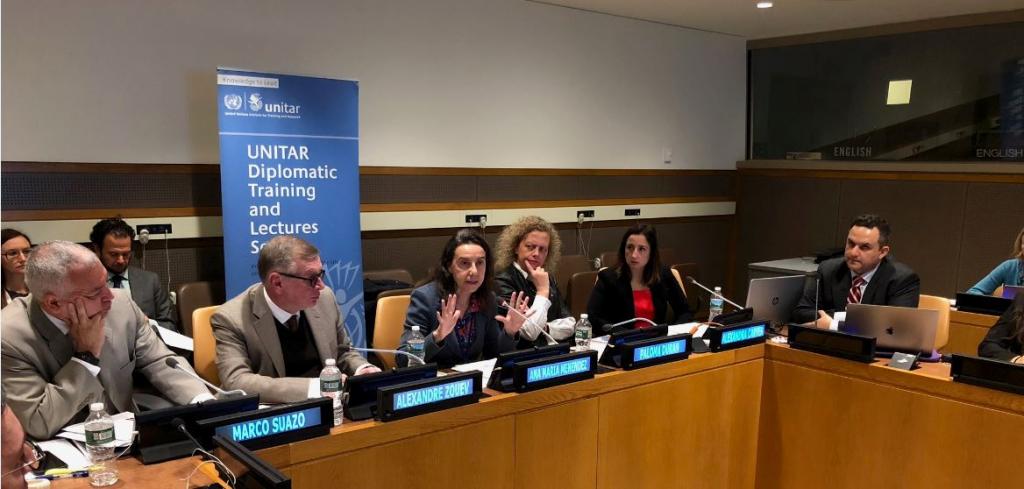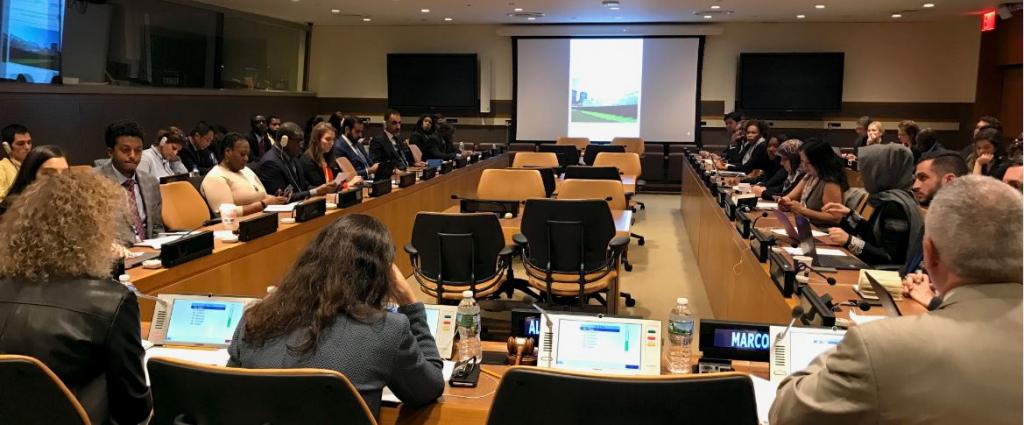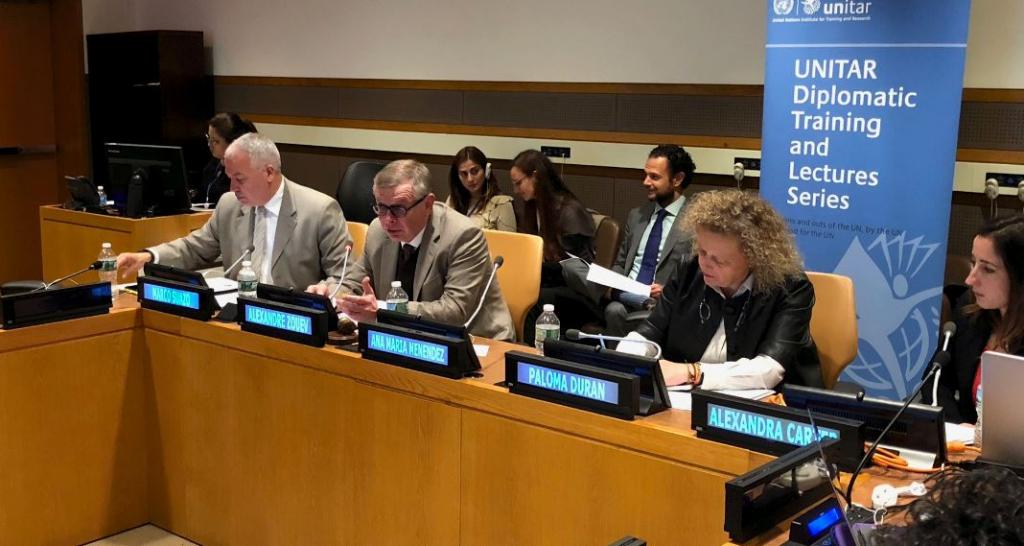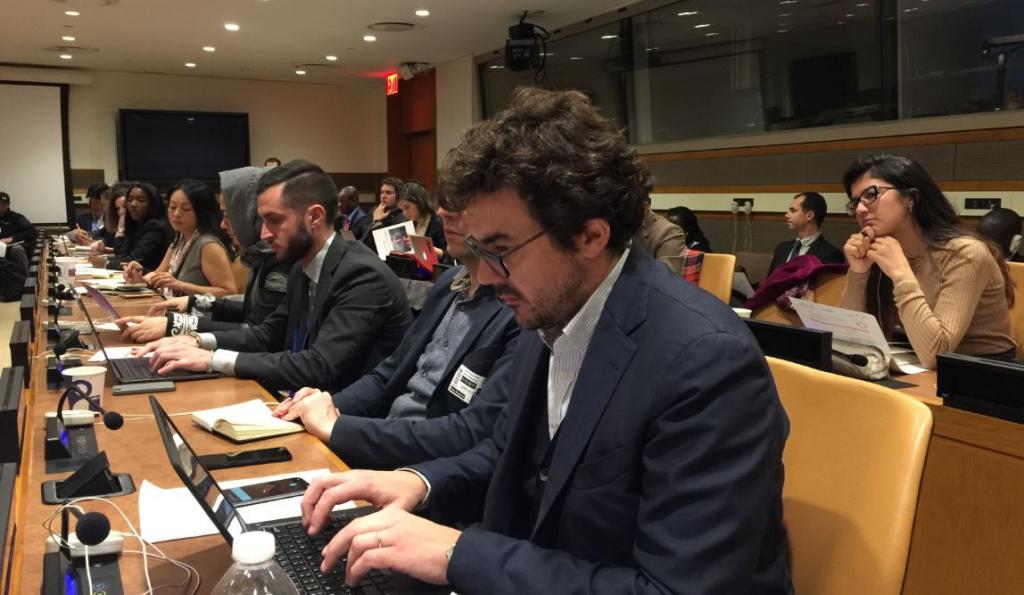UNITAR Hosts Briefing on "Strengthening Preventive Diplomacy and Multilateral Negotiation"
 31 October 201, New York, United States - The United Nations Institute for Training and Research (UNITAR) hosted the New York Briefing on “Strengthening Preventive Diplomacy and Multilateral Negotiation” in close collaboration with the Sustainable Development Goals Fund (SDG-Fund), and the Escuela Diplomática España (Diplomatic School of Spain). The briefing served as the first phase of the international conference, and focused primarily on Goal 16: Peace, justice and strong institutions, the revitalization of the preventive diplomacy discourse within the United Nations system, spearheaded by the Office of the United Nations Secretary-General and current UN Secretary-General António Guterres, and the ways in which conflict prevention and multilateral negotiation can be integrated in the achievement of the 2030 Agenda for Sustainable Development, and its various crosscutting goals and targets. The briefing panel consisted of high-level officials from within and beyond the Secretariat, namely Under Secretary-General (USG) and Senior Advisor on Policy H.E. Ms. Ana Maria Menéndez, Assistant Secretary-General of Rule of Law and Security (Department of Peacekeeping Operations (DPKO)) Mr. Alexandre Zouev, and Clinical Professors of Law, Columbia Law School Professors Alexandra Carter and Shawn Watts, and the Director of the SDG-Fund, Dr. Paloma Duran. Many of the participants present for the briefing also represented a range of organizations and UN offices, agencies, and ambassadors and staff of permanent missions to the UN.
31 October 201, New York, United States - The United Nations Institute for Training and Research (UNITAR) hosted the New York Briefing on “Strengthening Preventive Diplomacy and Multilateral Negotiation” in close collaboration with the Sustainable Development Goals Fund (SDG-Fund), and the Escuela Diplomática España (Diplomatic School of Spain). The briefing served as the first phase of the international conference, and focused primarily on Goal 16: Peace, justice and strong institutions, the revitalization of the preventive diplomacy discourse within the United Nations system, spearheaded by the Office of the United Nations Secretary-General and current UN Secretary-General António Guterres, and the ways in which conflict prevention and multilateral negotiation can be integrated in the achievement of the 2030 Agenda for Sustainable Development, and its various crosscutting goals and targets. The briefing panel consisted of high-level officials from within and beyond the Secretariat, namely Under Secretary-General (USG) and Senior Advisor on Policy H.E. Ms. Ana Maria Menéndez, Assistant Secretary-General of Rule of Law and Security (Department of Peacekeeping Operations (DPKO)) Mr. Alexandre Zouev, and Clinical Professors of Law, Columbia Law School Professors Alexandra Carter and Shawn Watts, and the Director of the SDG-Fund, Dr. Paloma Duran. Many of the participants present for the briefing also represented a range of organizations and UN offices, agencies, and ambassadors and staff of permanent missions to the UN.
 Mr. Marco A. Suazo, UNITAR New York Head of Office, initiated the welcoming remarks of the conference, grounding the discussion with a background on the emergence of the prevention discourse in the 1990s, during the term of then Secretary-General Boutros Boutros-Ghali, particularly the landmark document, “An Agenda for Peace” (1992). He also touched on the key themes that will be addressed by the panel, such as reforms in the peace and security pillars of the UN, and ways in which multilateral negotiation can be used as a tool or mechanism to identify and address the structural and root causes of crisis and conflict.
Mr. Marco A. Suazo, UNITAR New York Head of Office, initiated the welcoming remarks of the conference, grounding the discussion with a background on the emergence of the prevention discourse in the 1990s, during the term of then Secretary-General Boutros Boutros-Ghali, particularly the landmark document, “An Agenda for Peace” (1992). He also touched on the key themes that will be addressed by the panel, such as reforms in the peace and security pillars of the UN, and ways in which multilateral negotiation can be used as a tool or mechanism to identify and address the structural and root causes of crisis and conflict.
Mr. Suazo then passed the floor to Dr. Paloma Duran, who introduced Under Secretary-General H.E. Ms. Ana Maria Menéndez, to deliver the keynote address for the panel. H.E. Ms. Menéndez spoke in detail about the key policy reforms proposed by the Office of Secretary-General, such as the focus on ensuring a joined-up analysis and system-wide adoption of preventive diplomacy, and the importance of inclusive peacemaking, with particular attention to gender parity in high-level working and advisory groups in peacekeeping operations and political missions.
USG Ms. Menéndez was then followed by Professor Alexandra Carter, who provided a joint presentation with Professor Shawn Watts. The professors discussed in detail the nature and background of multilateral negotiation, the “ripeness” of timing for intervention of peacekeeping operations, and matching the process of negotiation with the values being promoted and protected (e.g., equality and equity, sustainability, inclusivity, etc.).
Both panel sessions were followed by a joint Q & A session with H.E. Ms. Menéndez, with highlights including the importance of gender-sensitive and gender-responsive peacebuilding, and the nuances between crisis and conflict prevention.
 The final panellist was Assistant Secretary-General of Rule of Law and Security, Mr. Alexandre Zouev. He discussed in detail the particular work that is being done in his office under the DPKO, the Rule of Law and Security Office. He provided concrete examples by drawing from over three decades of experience working in various sectors of the United Nations on both political and developmental fronts such as the United Nations Development Programme (UNDP) and DPKO, working with special political missions, and in various stations in the field, from Haiti to Tajikistan. He provided insights on the crosscutting nature of conflict prevention and the need to focus on several factors in preventive diplomacy, including crises emerging around electoral processes.
The final panellist was Assistant Secretary-General of Rule of Law and Security, Mr. Alexandre Zouev. He discussed in detail the particular work that is being done in his office under the DPKO, the Rule of Law and Security Office. He provided concrete examples by drawing from over three decades of experience working in various sectors of the United Nations on both political and developmental fronts such as the United Nations Development Programme (UNDP) and DPKO, working with special political missions, and in various stations in the field, from Haiti to Tajikistan. He provided insights on the crosscutting nature of conflict prevention and the need to focus on several factors in preventive diplomacy, including crises emerging around electoral processes.
The final Q & A highlighted, for both ASG Mr. Zouev and the Columbia Law School, questions about the role of culture and context, the role of multiple stakeholders in conflict, personal challenges in conflict prevention, and establishing accountability mechanisms (especially post-conflict).
To close the panel, Mr. Suazo framed the briefing with four main themes gained from the conference, namely: 1) the critical nature of cross-cutting approaches to conflict to resolve the root and structural causes, such as such as poverty, inequality and discrimination on the basis of gender, race and ethnicity, class, and religious affiliation, environmental degradation, and overall lack of sustainable infrastructure and access to basic resources; 2) preventive diplomacy and multilateral negotiation can be framed as tools to advance cross-cutting targets for all SDGs; 3) the relationship between peace and development is bidirectional; peace is critical for interdisciplinary sustainable development endeavours, and economic, social and environmental development must be guaranteed to achieve durable peace; and 4) multilateral negotiation itself can be used as a governance mechanism by which governments and other stakeholders can skilfully navigate multilateral priorities and effectively coordinate action towards achieving the SDGs.
 Mr. Suazo presented briefly on expectations of the upcoming second phase of the international conference to be held in Madrid, Spain in the second week of January of 2018. The one-day conference will consist of two regional panels, one representing European perspectives, and another Spanish and Latin American (to be conducted in Spanish). He affirmed that the New York Briefing was successful in not only providing a background for the second phase of the International Conference, but also opening up discourse and raising questions that can be addressed in the future event. He explained that the focus of the second phase of the International Conference will be the importance of incorporating and integrating multiple stakeholders and perspectives from different backgrounds and contexts, in particular diplomatic academies, academia, and UN officials. Looking forward, outcomes from the conference can then be used to enrich diplomatic schools in Europe and the Americas.
Mr. Suazo presented briefly on expectations of the upcoming second phase of the international conference to be held in Madrid, Spain in the second week of January of 2018. The one-day conference will consist of two regional panels, one representing European perspectives, and another Spanish and Latin American (to be conducted in Spanish). He affirmed that the New York Briefing was successful in not only providing a background for the second phase of the International Conference, but also opening up discourse and raising questions that can be addressed in the future event. He explained that the focus of the second phase of the International Conference will be the importance of incorporating and integrating multiple stakeholders and perspectives from different backgrounds and contexts, in particular diplomatic academies, academia, and UN officials. Looking forward, outcomes from the conference can then be used to enrich diplomatic schools in Europe and the Americas.
Dr. Duran affirmed the value of these materials for the development of the online e-course with the same name (“Strengthening Preventive Diplomacy and Multilateral Negotiation”), sponsored by the SDG-Fund, and invited all participants to an upcoming event for Friday, 3 November 2017, the launch of the report “Business and Peace: How the Private Sector Can Contribute to SDG 16?”. She and Mr. Suazo closed the event by extending their deep gratitude to the UNITAR and SDG-Fund teams, and the participants for their attendance and attention during this crucial and timely Briefing.
Photos: Panelists and participants of the Briefing

